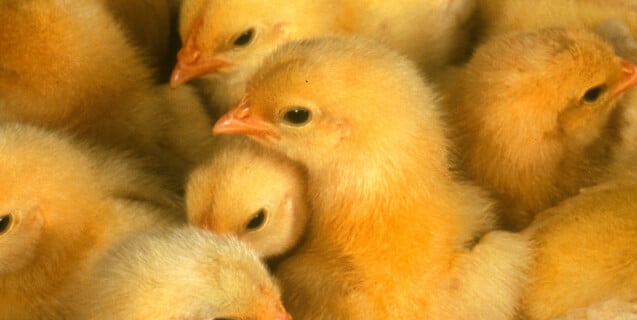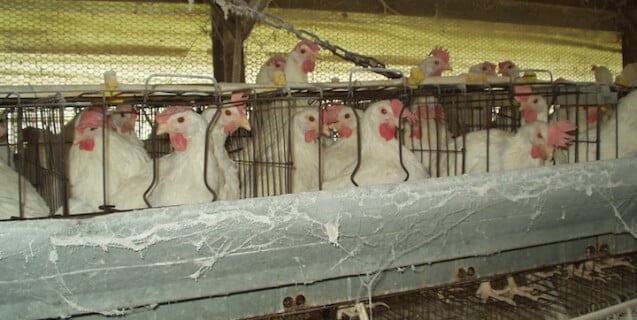The following article was written by PETA Foundation staffer Heather Moore.
Ever since the massive salmonella outbreak and ensuing egg recall, many people have been scrambling to buy eggs from free-range farms, thinking that they’re healthier and more humane than eggs from factory farms. While buying eggs from local farmers who don’t cram hens into small, filthy cages is kinder than buying eggs that were produced on factory farms, it’s not a truly viable—or humane—solution.
More than 300 million hens are raised on factory egg farms every year—approximately 95 percent of the eggs produced in America come from factory-farmed birds. The sheer number of animals raised to satisfy people’s taste for eggs, meat, and milk makes it impossible for us to raise and kill them all on small farms.
Labels—other than “organic”—on egg cartons are not subject to any government regulations. In many cases, animals raised on organic or free-range farms suffer from the same painful mutilations as animals raised on conventional farms. “Free-range” or “organic” labels don’t guarantee that animals are treated humanely any more than KFC’s flowery assurances about its animal welfare practices guarantees that animals raised for its restaurants don’t suffer.
“If you go to a free-range farm and expect to see a bunch of chickens galloping around in pastures, you’re kidding yourself.”—Richard Lobb, spokesperson for the National Chicken Council
Most hens on large-scale commercial cage-free farms still have their sensitive beaks cut off with a hot blade and are crammed together in filthy sheds. They never go outside, breathe fresh air, feel the sun on their backs, or do anything else that is natural or important to them. They suffer from the same lung lesions and ammonia burns as hens in cages, as well as breast blisters from sitting on urine- and feces-covered floors. Male chicks are often ground up alive or left to suffocate because they don’t lay eggs and are considered too small a breed to be profitably used for meat.

Chickens and other animals raised on organic or free-range farms are typically transported to the same terrifying slaughterhouses used by factory farms. Many animals are scalded to death or dismembered while they’re still conscious.
It’s not just our farming practices that need to change but also our eating habits. While PETA supports any action that helps reduce animal suffering, we believe that the only truly humane option is for people to choose tasty vegan alternatives to meat, eggs, and dairy products. Think about it: Would you encourage someone who beats their children to beat them less violently and less often? Or would you tell them to stop beating their children altogether? Less frequent, softer beatings would certainly be less painful for the children, but they’re not really a compassionate alternative.
Fortunately, as more people realize that animals—who are made of flesh, bone, and blood, just as humans are—have interests and feelings that must be protected, they will eventually also come to realize that there’s no good reason to raise them for food in the first place. There are humane, healthy, and delicious vegan options, which are the kindest, safest choice.
Text VEG to 73822 to get the latest vegan lifestyle tips, recipes, and urgent action alerts texted right to your phone.
Terms for automated texts/calls from PETA: https://peta.vg/txt. Text STOP to end, HELP for more info. Msg/data rates may apply. U.S. only.









